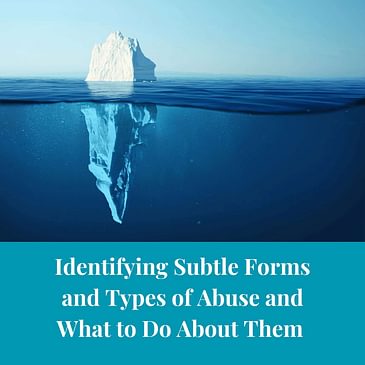Episode Description
In Subtle Types and Forms of Abuse and What to Do About Them, we discuss the hidden nature of certain types and forms of abuse and why these forms of abuse often go unnoticed, why the survivor doesn't always believe it is abuse, and how certain people use these forms sow doubt and confusion in the survivor as a form of control and manipulation. The unique nature of this kind of abuse is often unnoticed or not believed by outsiders. However, by learning to identify and understand these forms of abuse, we are able to understand what is happening to us if we are in a situation with hidden and subtle abuse, while distinguishing between abuse and normal human flaws in a relationship that we all have. When we can identify these forms of abuse and call them by their name, we can validate our experiences, know our experiences are real, seek help and resources that can help us untangle this confusion, and get our lives back so we can find clarity and safety in our lives, living the life God intended us to live.
Breakdown of Episode
1:17 Intro
6:00 Intro to Subtle Forms and Types of Abuse
10:25 What Are Some of the Subtle Signs of Abuse?
27:06 Why Are Subtle Forms of Abuse Easy to Miss?
50:07 Subtle Abuse in Churches Religious Communities
52:55 How to Detect and Heal Subtle Forms of Abuse
To view resources, go HERE.
https://docs.google.com/document/d/1HKq9dBS-VXjFYkAT2mdOcjNKAfL5B6fC4Mz8czio-c0/edit?usp=sharing
Christian Emotional Recovery Resources
Podcast Website
Access Episodes, Get Free Resources, and More
https://christianemotionalrecovery.com/
Facebook Group
Join Community, Get Support, and Get Weekly Encouragement
https://www.facebook.com/groups/christianemotionalrecovery
YouTube Channel
Subscribe for Exclusive Material Not on Podcast
https://www.youtube.com/channel/UC4a5jGXZ0-qzPINAspnLwPw
Christian Emotional Recovery Store
Get meditations, infographics, journals, and other resources for your healing journey
https://www.rachelleroy.com/9527496b-b1ed-4744-875f-dd04bfd3ad2a
Trauma Survivors
Check out Resources Page for Trauma Survivors
https://www.rachelleroy.com/bc953a63-...

